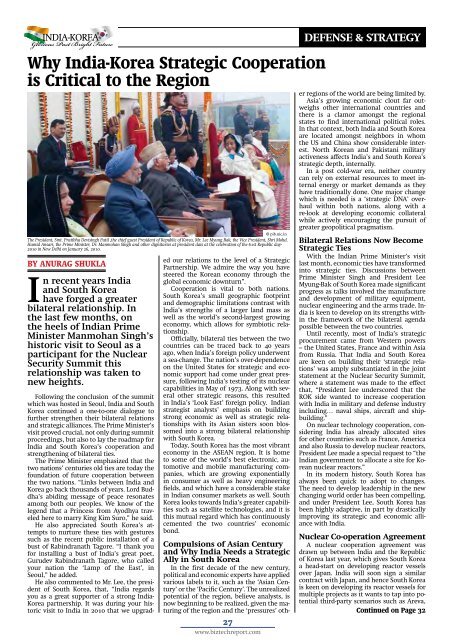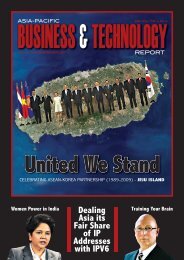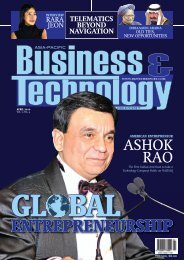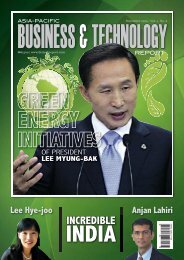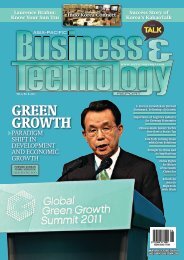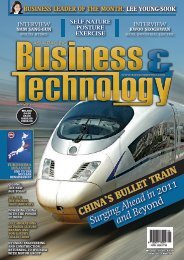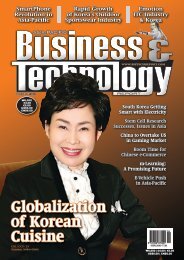INDIA-KOREA - Asia-Pacific Business and Technology Report
INDIA-KOREA - Asia-Pacific Business and Technology Report
INDIA-KOREA - Asia-Pacific Business and Technology Report
You also want an ePaper? Increase the reach of your titles
YUMPU automatically turns print PDFs into web optimized ePapers that Google loves.
<strong>INDIA</strong>-<strong>KOREA</strong><br />
Glorious Past Bright Future<br />
Why India-Korea Strategic Cooperation<br />
is Critical to the Region<br />
© pib.nic.in<br />
The President, Smt. Pratibha Devisingh Patil ,the chief guest President of Republic of Korea, Mr. Lee Myung Bak, the Vice President, Shri Mohd.<br />
Hamid Ansari, the Prime Minister, Dr. Manmohan Singh <strong>and</strong> other dignitaries at president dais at the celebration of the 61st Republic day-<br />
2010 in New Delhi on January 26, 2010.<br />
by Anurag Shukla<br />
In recent years India<br />
<strong>and</strong> South Korea<br />
have forged a greater<br />
bilateral relationship. In<br />
the last few months, on<br />
the heels of Indian Prime<br />
Minister Manmohan Singh’s<br />
historic visit to Seoul as a<br />
participant for the Nuclear<br />
Security Summit this<br />
relationship was taken to<br />
new heights.<br />
Following the conclusion of the summit<br />
which was hosted in Seoul, India <strong>and</strong> South<br />
Korea continued a one-to-one dialogue to<br />
further strengthen their bilateral relations<br />
<strong>and</strong> strategic alliances. The Prime Minister’s<br />
visit proved crucial, not only during summit<br />
proceedings, but also to lay the roadmap for<br />
India <strong>and</strong> South Korea’s cooperation <strong>and</strong><br />
strengthening of bilateral ties.<br />
The Prime Minister emphasized that the<br />
two nations’ centuries old ties are today the<br />
foundation of future cooperation between<br />
the two nations. “Links between India <strong>and</strong><br />
Korea go back thous<strong>and</strong>s of years. Lord Buddha’s<br />
abiding message of peace resonates<br />
among both our peoples. We know of the<br />
legend that a Princess from Ayodhya traveled<br />
here to marry King Kim Suro,” he said.<br />
He also appreciated South Korea’s attempts<br />
to nurture these ties with gestures<br />
such as the recent public installation of a<br />
bust of Rabindranath Tagore. “I thank you<br />
for installing a bust of India’s great poet,<br />
Gurudev Rabindranath Tagore, who called<br />
your nation the ‘Lamp of the East’, in<br />
Seoul,” he added.<br />
He also commented to Mr. Lee, the president<br />
of South Korea, that, “India regards<br />
you as a great supporter of a strong India-<br />
Korea partnership. It was during your historic<br />
visit to India in 2010 that we upgraded<br />
our relations to the level of a Strategic<br />
Partnership. We admire the way you have<br />
steered the Korean economy through the<br />
global economic downturn”.<br />
Cooperation is vital to both nations.<br />
South Korea’s small geographic footprint<br />
<strong>and</strong> demographic limitations contrast with<br />
India’s strengths of a larger l<strong>and</strong> mass as<br />
well as the world’s second-largest growing<br />
economy, which allows for symbiotic relationship.<br />
Officially, bilateral ties between the two<br />
countries can be traced back to 40 years<br />
ago, when India’s foreign policy underwent<br />
a sea-change. The nation’s over-dependence<br />
on the United States for strategic <strong>and</strong> economic<br />
support had come under great pressure,<br />
following India’s testing of its nuclear<br />
capabilities in May of 1973. Along with several<br />
other strategic reasons, this resulted<br />
in India’s ‘Look East’ foreign policy. Indian<br />
strategist analysts’ emphasis on building<br />
strong economic as well as strategic relationships<br />
with its <strong>Asia</strong>n sisters soon blossomed<br />
into a strong bilateral relationship<br />
with South Korea.<br />
Today, South Korea has the most vibrant<br />
economy in the ASEAN region. It is home<br />
to some of the world’s best electronic, automotive<br />
<strong>and</strong> mobile manufacturing companies,<br />
which are growing exponentially<br />
in consumer as well as heavy engineering<br />
fields, <strong>and</strong> which have a considerable stake<br />
in Indian consumer markets as well. South<br />
Korea looks towards India’s greater capabilities<br />
such as satellite technologies, <strong>and</strong> it is<br />
this mutual regard which has continuously<br />
cemented the two countries’ economic<br />
bond.<br />
Defense & STRATEGY<br />
Compulsions of <strong>Asia</strong>n Century<br />
<strong>and</strong> Why India Needs a Strategic<br />
Ally in South Korea<br />
In the first decade of the new century,<br />
political <strong>and</strong> economic experts have applied<br />
various labels to it, such as the ‘<strong>Asia</strong>n Century’<br />
or the ‘<strong>Pacific</strong> Century’. The unrealized<br />
potential of the region, believe analysts, is<br />
now beginning to be realized, given the maturing<br />
of the region <strong>and</strong> the ‘pressures’ oth-<br />
27<br />
www.biztechreport.com<br />
er regions of the world are being limited by.<br />
<strong>Asia</strong>’s growing economic clout far outweighs<br />
other international countries <strong>and</strong><br />
there is a clamor amongst the regional<br />
states to find international political roles.<br />
In that context, both India <strong>and</strong> South Korea<br />
are located amongst neighbors in whom<br />
the US <strong>and</strong> China show considerable interest.<br />
North Korean <strong>and</strong> Pakistani military<br />
activeness affects India’s <strong>and</strong> South Korea’s<br />
strategic depth, internally.<br />
In a post cold-war era, neither country<br />
can rely on external resources to meet internal<br />
energy or market dem<strong>and</strong>s as they<br />
have traditionally done. One major change<br />
which is needed is a ‘strategic DNA’ overhaul<br />
within both nations, along with a<br />
re-look at developing economic collateral<br />
while actively encouraging the pursuit of<br />
greater geopolitical pragmatism.<br />
Bilateral Relations Now Become<br />
Strategic Ties<br />
With the Indian Prime Minister’s visit<br />
last month, economic ties have transformed<br />
into strategic ties. Discussions between<br />
Prime Minister Singh <strong>and</strong> President Lee<br />
Myung-Bak of South Korea made significant<br />
progress as talks involved the manufacture<br />
<strong>and</strong> development of military equipment,<br />
nuclear engineering <strong>and</strong> the arms trade. India<br />
is keen to develop on its strengths within<br />
the framework of the bilateral agenda<br />
possible between the two countries.<br />
Until recently, most of India’s strategic<br />
procurement came from Western powers<br />
– the United States, France <strong>and</strong> within <strong>Asia</strong><br />
from Russia. That India <strong>and</strong> South Korea<br />
are keen on building their ‘strategic relations’<br />
was amply substantiated in the joint<br />
statement at the Nuclear Security Summit,<br />
where a statement was made to the effect<br />
that, “President Lee underscored that the<br />
ROK side wanted to increase cooperation<br />
with India in military <strong>and</strong> defense industry<br />
including… naval ships, aircraft <strong>and</strong> shipbuilding.”<br />
On nuclear technology cooperation, considering<br />
India has already allocated sites<br />
for other countries such as France, America<br />
<strong>and</strong> also Russia to develop nuclear reactors,<br />
President Lee made a special request to “the<br />
Indian government to allocate a site for Korean<br />
nuclear reactors.”<br />
In its modern history, South Korea has<br />
always been quick to adopt to changes.<br />
The need to develop leadership in the new<br />
changing world order has been compelling,<br />
<strong>and</strong> under President Lee, South Korea has<br />
been highly adaptive, in part by drastically<br />
improving its strategic <strong>and</strong> economic alliance<br />
with India.<br />
Nuclear Co-operation Agreement<br />
A nuclear cooperation agreement was<br />
drawn up between India <strong>and</strong> the Republic<br />
of Korea last year, which gives South Korea<br />
a head-start on developing reactor vessels<br />
over Japan. India will soon sign a similar<br />
contract with Japan, <strong>and</strong> hence South Korea<br />
is keen on developing its reactor vessels for<br />
multiple projects as it wants to tap into potential<br />
third-party scenarios such as Areva,<br />
Continued on Page 32


